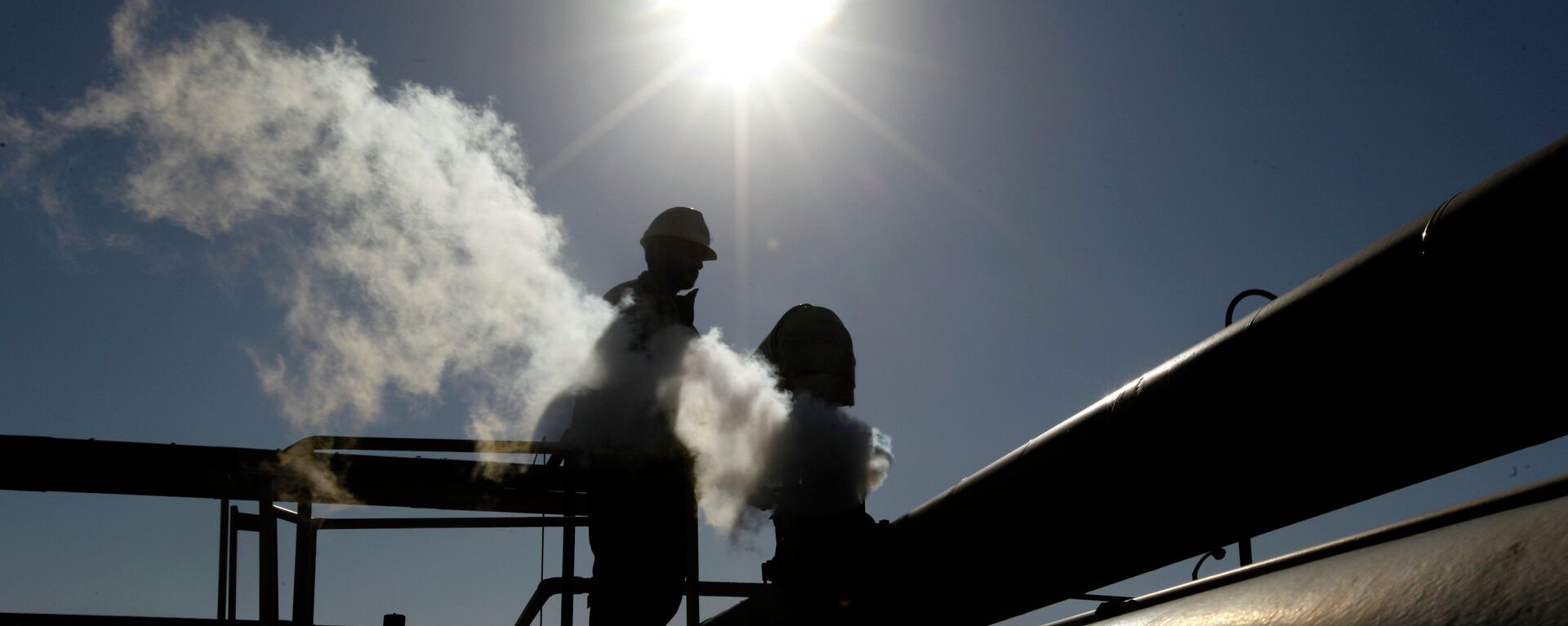https://en.sputniknews.africa/20230716/libya-announces-resumption-of-oil-production-at-two-major-fields-oil-ministry-1060561526.html
Libya Announces Resumption of Oil Production at Two Major Fields
Libya Announces Resumption of Oil Production at Two Major Fields
Sputnik Africa
On Thursday, protesters in Libya blocked the country's two largest oilfields. According to the protesters, who are mainly from the Al-Zawi tribe, the reason... 16.07.2023, Sputnik Africa
2023-07-16T11:51+0200
2023-07-16T11:51+0200
2023-08-03T10:47+0200
libya
oil
muammar gaddafi
minister
maghreb
north africa
politics
https://cdn1.img.sputniknews.africa/img/07e7/07/08/1060422316_0:0:3048:1714_1920x0_80_0_0_4a66d9c47358594a5a6aa688cdae5304.jpg
Libya's Ministry of Oil and Gas announced that oil production at the country's two largest fields – El Feel and Sharara - were resuming after they were unblocked by protesters, the ministry said in a statement.Following Saturday's closure, the ministry reported that work has restarted and oil production at the Sharara field, which is managed by Akakus Oil Operations, and the El Feel field, which is managed by the Mellitah oil and gas company.Earlier, the head of the Supreme Council of the Al-Zawi Tribes, Sheikh Al-Senussi Al-Haliq, told Sputnik that protesters in Libya intend to leave the oil fields since the former finance minister of the Cabinet of Ministers in Tripoli was released.On Saturday, news emerged that the ex-head of the Ministry of Finance of the GNA (which existed in 2015-2021) was released after the nation's Prosecutor General had intervened. Earlier, the nation's Minister of Oil and Gas of the Government of National Unity (GNU), Mohamed Aoun, said that Libya was losing about 340,000 barrels per day due to the closure of the two oil fields by local tribes. After the overthrow and assassination of Libyan leader Muammar Gaddafi in 2011, Libya ceased to function as a single state. Over the past few years, the authorities in Tripoli in the country's west and its rival government in the east, which were supported by the Libyan National Army under the command of Marshal Khalifa Haftar, have been at loggerheads. In 2021, the Libyan Political Dialogue Forum in Geneva under the auspices of the United Nations elected a transitional executive until the general elections, which have not yet been held. At the moment, there are two governments in Libya that do not recognize each other. The GNU – supported by the UN and headed by Abdul Hamid Dbeibeh that operates out of Tripoli. The second – empowered by the House of Representatives – is based in Sirte and temporarily led by Osama Hamada after the removal of Fathi Bashagha.
https://en.sputniknews.africa/20230715/closure-of-libyas-major-oil-fields-threatening-domestic-production-oil-ministry-1060550356.html
libya
maghreb
north africa
Sputnik Africa
feedback@sputniknews.com
+74956456601
MIA „Rossiya Segodnya“
2023
Rasina Musallimova
https://cdn1.img.sputniknews.africa/img/07e7/0a/17/1063019139_0:0:646:646_100x100_80_0_0_348c74b69cf86748a53875f8148a2f85.jpg
Rasina Musallimova
https://cdn1.img.sputniknews.africa/img/07e7/0a/17/1063019139_0:0:646:646_100x100_80_0_0_348c74b69cf86748a53875f8148a2f85.jpg
News
en_EN
Sputnik Africa
feedback@sputniknews.com
+74956456601
MIA „Rossiya Segodnya“
Sputnik Africa
feedback@sputniknews.com
+74956456601
MIA „Rossiya Segodnya“
Rasina Musallimova
https://cdn1.img.sputniknews.africa/img/07e7/0a/17/1063019139_0:0:646:646_100x100_80_0_0_348c74b69cf86748a53875f8148a2f85.jpg
libya, oil, muammar gaddafi, minister, maghreb , north africa, politics
libya, oil, muammar gaddafi, minister, maghreb , north africa, politics
Libya Announces Resumption of Oil Production at Two Major Fields
11:51 16.07.2023 (Updated: 10:47 03.08.2023) On Thursday, protesters in Libya blocked the country's two largest oilfields. According to the protesters, who are mainly from the Al-Zawi tribe, the reason for such a protest was the detention in the capital Tripoli of their tribesman, former Finance minister in the Government of National Accord (GNA) Faraj Bumatari.
Libya's Ministry of Oil and Gas announced that oil production at the country's two largest fields – El Feel and Sharara - were resuming after they were unblocked by protesters, the ministry said in a statement.
Following Saturday's closure, the ministry reported that work has restarted and oil production at the Sharara field, which is managed by Akakus
Oil Operations, and the El Feel field, which is managed by the Mellitah oil and gas company.
Earlier, the head of the Supreme Council of the Al-Zawi Tribes, Sheikh Al-Senussi Al-Haliq, told Sputnik that protesters in Libya intend to leave the oil fields since the former finance minister of the Cabinet of Ministers in Tripoli was released.
On Saturday, news emerged that the ex-head of the Ministry of Finance of the GNA (which existed in 2015-2021) was released after the nation's Prosecutor General had intervened.
Earlier, the nation's Minister of Oil and Gas of the Government of National Unity (GNU), Mohamed Aoun, said that
Libya was losing about 340,000 barrels per day due to the closure of the two oil fields by local tribes.
After the overthrow and assassination of
Libyan leader Muammar Gaddafi in 2011, Libya ceased to function as a single state. Over the past few years, the authorities in Tripoli in the country's west and its rival government in the east, which were supported by the Libyan National Army under the command of Marshal Khalifa Haftar, have been at loggerheads.
In 2021, the Libyan Political Dialogue Forum in Geneva under the auspices of the United Nations elected a transitional executive until the general elections, which have not yet been held.
At the moment, there are two governments in Libya that do not recognize each other. The GNU – supported by the UN and headed by Abdul Hamid Dbeibeh that operates out of
Tripoli. The second – empowered by the House of Representatives – is based in Sirte and temporarily led by Osama Hamada after the removal of Fathi Bashagha.



